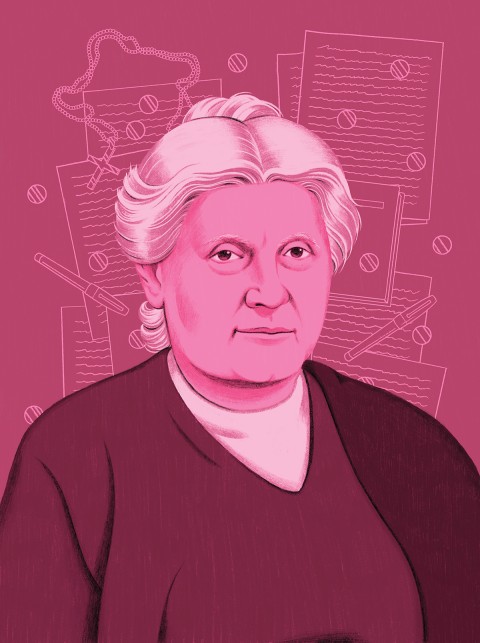A rich woman who took the Magnificat seriously
Vida Dutton Scudder, an early 20th-century radical, points Christians to solidarity and martyrdom.

Social activist and writer Vida Dutton Scudder (Illustration by Claire Merchlinsky)
After I moved to Dallas in 2021, I joined a church community that is both more progressive and wealthier than any other I’ve been a part of. I’d been wrestling with the question of what it means for Christians to put our money where our mouths are when we say we worship a God who sides with the poor. My struggle only intensified in a congregation that both welcomes the question and inhabits a city riven by wealth disparities.
While researching my book on the literary Christian left, I discovered a searching and faithful guide to these issues: Vida Dutton Scudder. A child of missionaries with deep family connections to Boston’s upper classes and their deep pockets, Scudder soon turned class traitor. She was radicalized as a graduate student at Oxford in the 1880s, where she heard some of the final public lectures of the English social critic John Ruskin. While in England, she worked for the Salvation Army, and when she returned to the States, she helped to start the settlement house movement, which strove to alleviate poverty by bringing the middle classes into social proximity with the poor. She was also a founder of the Church of the Carpenter in Boston, a Christian socialist congregation intended to unite laborers with the educated classes in worship. She recalled that the people there “sang with special zeal the Magnificat . . . and feasted on . . . the hope of an imminent revolution.”
Read our latest issue or browse back issues.
This sort of thing isn’t easy. The Church of the Carpenter’s experiment in uniting middle class and poor under one church roof lasted only a few months. But the congregation served as a launchpad for Scudder’s lifelong task of harmonizing class struggle with Christian love.
In her 1917 essay collection The Church and the Hour, Scudder names the “extraordinary paradox” of the church’s social position: “The disinherited and the humble were the first to profess the faith, and the formulae of that faith are theirs. The prosperous are those who now profess it, and the formulae are strange upon their lips.” Ancient cries of the dispossessed such as Mary’s prayer—the prayer of a young woman in an occupied country, who believes God takes the part of her people and will set them free from oppression—sound awkward coming from a congregation whose parking lot is filled with BMWs. “The hungry and the meek no longer sing the Magnificat,” writes Scudder. “Respectable and relatively prosperous people fill the churches so far as they are filled,” while “those who extol a homeless Lord command fair homes where their children gather in peace around them.” As a queer woman excluded from this domestic dream, Scudder was well positioned to call out its distance from the blessed life of Jesus in the gospels.
The people of my congregation are respectable and relatively prosperous liberals, and that makes praying the Magnificat a bit weird. Mary’s prayer—the church’s prayer—doesn’t care about how you vote but about your structural position. Rich and powerful? Judgment is coming. Poor and powerless? God’s mercy is on its way. Thinking of my own neighborhood in Dallas, I could update its language: “He has taken away the houses of the renovators and the knockdown builders and stripped the landlords of their titles, and to the apartment renters and the couch surfers and the homeless he has given shelter and dignity.”
I feel the pull Scudder describes toward American prosperity and away from the imitation of Christ. My two young daughters share a bedroom, partly so I can have a home office. But bedtime is getting tough, and the clock is ticking on how long they can share the space comfortably. I’ve looked with longing into backyard tiny homes and garage conversions that might give us more space. I have a savings account dedicated to putting cash away for future renovations. We’re used to blandly calling this kind of material comfort a blessing. But Jesus said, “Blessed are the poor” (Matt. 5:3). What if what I’ve called tokens of God’s favor are actually signs of God’s judgment?
If I fear this judgment, or if I long to be closer to where Jesus is, I might begin to wonder: What is to be done? Scudder had an answer. She believed that “our paradox must hold a summons,” a calling to a God-given task: wealthy Christians must become martyrs.
Scudder knew the word martyr was likely to throw people off. She chalks this up to misunderstanding. Martyrdom, she argues, has been cheapened for us modern people. A martyr to us is merely a victim, a sufferer, but the word literally means witness. The early Christians who died for the faith were called martyrs not because they suffered and died but because their deaths witnessed to the truth and power of the good news of Jesus. Prosperous people who claim allegiance to a religion of the poor and powerless have an unprecedented opportunity to witness to the truth of the Christian faith by actually acceding to its demands regarding money and possessions. As with the early martyrs who gave their lives, this new martyrdom will involve painful sacrifice. But it might also win skeptics to the faith.
Scudder adopts the voice of an “outsider” to imagine how this political-economic martyrdom might appeal to a skeptic:
What we outsiders need in order to convince us that you Christians have indeed “broken through into reality” is to see those who can command luxury, choosing poverty so long as their brothers want; those who might rule men, industrially or politically, becoming true servants of the democracy. It is to find Christians voting in public matters steadily against their own class-interests, and in private life literally caring more to share than to own. This spectacle, we grant, would be an effective proof of a divine religion. But men are not likely to see it.
What Scudder calls for here is not merely philanthropic giving or social service. Such do-gooding reinforces the power of the ruling class by lending them an air of moral superiority. Instead, Scudder demands a costly solidarity that overturns social hierarchy.
The difference between philanthropy and solidarity on the political plane is akin to the difference between sympathy and empathy on the emotional plane. “I’m so sorry” seems caring but costs nothing and creates distance; “I’ve felt that too” actually draws people together at the price of vulnerable honesty. Charitable giving helps people in need without disturbing the hierarchy of need. To return to housing as a concrete example: solidarity looks like Christian homeowners acting against our own class interests by actively advocating for policies that will bring down our property values, bringing affordable housing for new neighbors into our midst.
Such actions, Scudder argues, constitute “an amazing spectacle,” even “a miracle. . . . For class interest is a force so subtle, universal, irresistible, that to bid men defy it is like bidding the body defy gravitation, the lungs refuse to breathe.” If acting against your economic interest is like holding your breath, then for the wealthy to pursue sustained solidarity with the poor is to accept a kind of death. This is how the privileged can imitate Christ: “Though he was rich, yet for your sakes he became poor, so that by his poverty you might become rich” (2 Cor. 8:9). But on the other side of that death waits resurrection: a new social body in which class conflict has been subsumed by love.
Yet the hope for a renewed society was not the ultimate why behind Scudder’s call for costly solidarity. Standing with the poor, for Scudder, isn’t a matter of just being good or doing the right thing; it’s what “honest discipleship to the Son of Mary under modern conditions” involves. The “primary duty” of the church, she writes, is “to keep open the channel between the temporal and the Eternal, through sacraments, through the Word of God, through . . . disciplines of the interior life.” To neglect this duty in favor of “solving social problems” would be a catastrophe.
Scudder’s Christian socialism emerges from and is suffused with her devotion to Christ. And ultimately, her politics come second to that devotion. In a moving passage meditating on the descent from the cross in John 19, she writes:
For He whom we adore is God on the Rood of the world. It is the God involved in the process of time, in the flux of mortal history: the God defeated, crucified, Whom we, by His mysterious will must aid if He is to come to His own. Our hands, alas, have nailed Him to that cross; without our help He cannot, because He will not, descend from it; and to aid Him we must climb to His side.
The descent of the privileged to solidarity with the poor is, in truth, our ascent to be with Jesus on the cross.
Knowing the crucified Christ intimately requires becoming like him in his death. “By the cross ‘the world is crucified unto me, and I unto the world.’ If the phrase is to regain a lost reality,” Scudder argues, “it must be translated into social terms. The ‘world’ to which it refers, to which it bids us be crucified, must be the world of the banker, of the merchant; of the solid business men who are the support of parishes; of the ladies from the leisure class who carry on the work of the Church.” This martyrdom, knowing and loving Christ by dying to the world, might cost us the very people, practices, and resources that sustain our churches as institutions. But what might we gain by it?
Imagine an end-of-year giving campaign in which we ask our wealthy members not to give to the church’s upkeep but to give their wealth away for the sake of their souls. And not over time, but now: more martyrdom campaign than estate planning. It might not be good for the financial future of our congregations. But Scudder reminds us to ask what it profits us to gain the whole world if we lose our souls.





